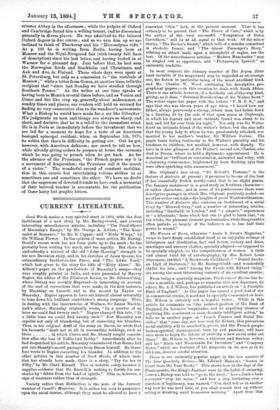CURRENT LITERATURE.
Good Words makes a very spirited start in 1894, with the first instalment of a new story by Mr. Baring-Gould, and several interesting miscellaneous articles, including " The Proof-Sheets of Maca,ulay's Essays," by Mr. George A. Aitken ; "The Kam- malot of Romance," by Mr. E. Capper; and "Birds' Wings," by Sir William Flower. In the opinion of most critics, Mr. Baring- Gould's recent work has not been quite up to the mark ; he has probably been writing too much, and too rapidly. But there is undoubtedly a revival of the old "John Herring" strength in his new Devonian story, and in his sketches of Jasen Quarm, his extraordinary brother-in-law Pasco, and "The Little Toad," -which last gives to the story the title of "Kitty Alone." Mr. Aitken's paper on the proof-sheets of Macaulay's essays—they were roughly printed in India, and were presented by Macvey Napier, the editor of the Edinburgh Review, to Mr. Gibson-Craig, whose library was recently dispersed—is interesting on account of the sort of corrections that were made, in the first instance, ty Macaulay on himself, and in the second by Napier on Macaulay. Napier appears to have set himself almost invariably to tone down his brilliant contributor's strong language. Thus, in dealing with the inaccuracies of Wallace, Sir James Mackin- tosh's editor, Macaulay originally wrote, "In a quarter of an 'hour we could find twenty such." Napier changed this into, "In a little time we could find twenty such." But Macaulay was capable not only of blundering, but of correcting his blunders. Thus, in his original draft of the essay on Bacon, he wrote that his favourite "dealt not at all in resounding nothings, such as those in which Cicero and Mr. Shandy sought consola- tion after the loss of Tullia and Bobby." Immediately after he bad despatched his article, Macaulay remembered that Sterne had put into Shandy's mouth passages from Bacon himself. He there- fore wrote to Napier correcting his blunder. In addition to the other articles in this number of Good Words, of which men- tion has already been made, there is a story, "Try for her in Fifty," by Mr. Clark Russell. This is notable solely because it supplies evidence that Mr. Russell is seeking to fortify his sea- stories by "fables from the land of spirits." This is, however, a sign of weakness rather than of strength.






































 Previous page
Previous page